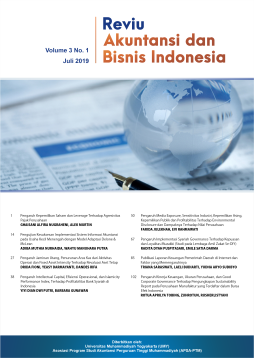Pengaruh Intellectual Capital, Efisiensi Operasional, dan Islamicity Performance Index, Terhadap Profitabilitas Bank Syariah di Indonesia
Main Article Content
Abstract
This study aims to analyze the influence of intellectual capital, operational efficiency, and islamicity performance index in the profitability of Indonesian Sharia Banks. The object in this study was all of sharia banks in Indonesia that registered at Otoritas Jasa Keuangan (OJK). In this study, 6 sharia banks with research period since 2012 until 2017 were selected using purposive sampling. Analysis tool used in this study is the SPSS. Based on the analysis that have been made the results are the intellectual capital does not influence profitability, the low level of operational efficiency has a negative influence on profitability, and islamicity performance index significantly influence the profitability.
Article Details
Artikel ini dilisensikan di bawah Creative Commons Attribution 4.0 International (CC BY 4.0), yang mengizinkan penggunaan, distribusi, dan reproduksi dalam media apa pun, selama atribusi yang sesuai diberikan kepada penulis asli dan sumbernya.
References
Andraeny, D., & Putri, D. D. (2017). Islamicity Performance Index in Indonesian Islamic Banks. Shirkah Journal of Economic and Bussiness, II (3), 345.
Andriana, R., Fauziah, E. N., & Bayuni, M. E. (2017). Pelaksanaan dan Pengungkapan Corporate Social Responsibility Perbankan Syariah dalam Perspektif Sharia Enterprise Theory. Jurnal Keuangan dan Perbankan Syariah, III (2), 513.
Awwalin, D. P. (2015). Peluang, Tantangan, dan Prospek Perbankan Syariah Indonesia dalam Menghadapi Persaingan Masyarakat Ekonomi Asean (Mea) 2015. Jurnal Akuntansi UNESA, III (2), 7.
Barney, J. B. (1991). Firm Resources and Sustained Competitive Advantage. Journal of Management, XVII (1), 99-120.
Ciptaningsih, T. (2013). Uji Pengaruh Modal Intelektual terhadap Kinerja Keuangan BUMN yang Go Public di Indonesia. Jurnal Manajemen Teknologi, XII (3), 342.
Dewanta, P., Hamidah, H., & Ahmad, G. N. (2016). The Effect of Intellectual Capital and Islamicity Performance Index to the Performance of Islamic Bank in Indonesia 2010-2014 Periods. Jurnal Riset Manajemen Sains Indonesia, VII (2), 275.
Fadjar, A., Esti, H., & Prihatini, T. (2017). Analisis Faktor Internal dan Eksternal Bank yang Memengaruhi Profitabilitas Bank Umum di Indonesia. Journal of Management and Bussiness Review, I (1), 66.
Ghosh, S., & Mondal, A. (2012). Indian Software and Pharamaceutical Sector IC and Financial Performances. Journal of Intellectual Capital, X (3), 369-388.
Ghozali, I. (2011). Aplikasi Analisis Multivariate dengan Program IBM SPSS 19, Edisi 5, Cetakan 5, Badan Penerbit Universitas Diponegoro, Semarang.
Hakiim, N., & Rafsanjani, H. (2016). Pengaruh Internal Capital Adequacy Ratio, Financing to Deposit Ratio, dan Biaya Operasional per Pendapatan Operasional dalam Peningkatan Profitablitas Industri Bank Syariah di Indonesia. Jurnal Perbankan Syariah, I (1), 64-72.
Hameed, S., dkk. (2004). Alternative Disclosure dan Performance for Islamic Bank’s, Proceeding of The Second Conference on Administrative Science: Meeting the Challenges of The Globalization Age. Dahran, Saud Arabia.
Harianto, S. (2017). Rasio Keuangan dan Pengaruhnya Terhadap Profitabilitas pada BPR Syariah di Indonesia. Jurnal Bisnis dan Manajemen, XII (1), 47.
Hasan, R., Mohammad, N., & Alam, M. F. (2017). Impact of Intellectual Capital on Profitability-Conventional vs Islamic Banks. Journal of Accounting, Finance, and Auditing Studies, III (3), 77.
Otoritas Jasa Keuangan. (2017). Statistik Perbankan Syariah Hingga Desember 2017, www.ojk.go.id. Diakses 1 Oktober 2018 pukul 16.00 WIB.
Ousama, A. A., & Fatima, A. H. (2015). Intellectual Capital and Islamic Performances of Islamic Banks. Journal Learning and Intellectual Capital, II (1), 11.
Ozkan, N., Cakan, S., & Kayacan, M. (2017). Intellectual Capital and Financial Performance: A Study of Turkish Banking Sector. Borsa Istanbul Review, XVII (3), 195.
Pal, K., & Soriya, S. (2012). IC Performances of Indian Pharmaceutical and Textile Industry. Journal of Intelletual Capital, XIII (1), 120-137.
Parawouw, M. A. (2014). The Application of CAMEL Model on Banks Listed on Indonesia Stock Exchange Period 2008-2010. International Bussiness Administration Journal University of Sam Ratulangi Manado, II (1), 124-233.
Prasetyo, D. A. & Darmayanti, N. P. A. (2015). Pengaruh Risiko Kredit, Likuiditas, Kecukupan Modal, dan Efisiensi Operasional Terhadap Profitabilitas pada PT BPD Bali. E-Journal Manajemen UNUD, IV (9), 2611-2612.
Pulic, A. (1998). Measuring the Performance of Intellectual Potential in Knowledge Economy. 2nd McMaster World Congress on Measuring and Managing Intellectual Capital.
Rosafitri, C. (2017). Interaksi Good Corporate Governance, Corporate Social Responsibility, Intellectual Capital, dan Pengaruhya Terhadap Kinerja Keuangan Perusahaan. Journal of Accounting Science, I (1), 17-18.
Sari, K. I., & Gunawan, B. (2011). Intellectual Capital On the Financial Performance and Company Growth. Jurnal Analisis Bisnis Ekonomi, IX (1), 8.
Ulum, I. (2013). Model Pengukuran Kinerja Intellectual Capital dengan iB-VAIC di Perbankan Syariah”, INFERENSI Jurnal Penelitian Sosial Keagamaan, VII (1), 198-202.
Umami, R. I. (2017). Pengaruh Intellectual Capital Terhadap Finnancial Performances Perusahaan: Perbandingan Antara Bank Syariah dan Bank Konvensional di Indonesia (Periode 2012-2016). Skripsi, Universitas Islam Negeri Sunan Kalijaga Yogyakarta, 125.
Wibowo, S. E., & Syaichu, M. (2013). Analisis Pengaruh Suku Bunga, Inflasi, CAR, BOPO, dan NPF Terhadap Profitabilitas Bank Syariah. Diponegoro Journal of Management, II (2), 19.

